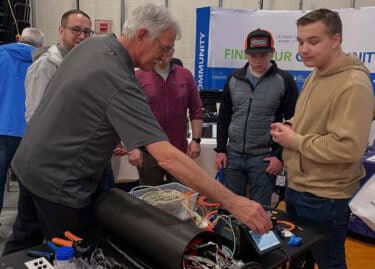Concord, NH – Nationally, community college students were hit hard by the pandemic. A recent survey showed that the job loss rate for community college students and the numbers that experienced food insecurity since the pandemic began were well above national averages. New Hampshire’s community college students faced similar challenges and the colleges got innovative to help students during these trying times.
A national survey from Chegg.org found that nearly one-third of students said they had experienced food insecurity since the coronavirus outbreak began. More than half of respondents said they have used off-campus food banks. About the same number of students also said hunger has “impacted their ability to study,” and more than half of students have accessed an off-campus food bank at least once, the survey found. Thirty-two percent of students surveyed reported they had been laid off due to the pandemic, and 40 percent of those who skipped meals said they did so to pay off debts or purchase study materials, the report said. Chegg.org is the research and advocacy arm of the course materials and services company Chegg.
Prior to the pandemic, six of the seven colleges that comprise the Community College System of NH (CCSNH) had onsite food pantries to assist students who had food insecurity needs. The seventh, White Mountains Community College, delayed its plans to open a food pantry due to the COVID-19 outbreak. With the sudden shift to remote operations in March 2020 and only a partial reopening this past summer and fall, the colleges have adopted new ways to connect with students and help during this vital time.
“There are great needs across all of our colleges and these needs were clearly exacerbated by the pandemic and the loss of so many jobs,” said Susan Huard, interim chancellor of CCSNH. “Our staff has worked very hard, going above and beyond to reach out to students and provide resources to ensure that they don’t go hungry. We greatly appreciate the support we have received from individuals and corporate partners such as the NH Charitable Foundation, Hannaford and others to help our students and support our communities.”
The Foundation for NH Community Colleges and the NH Charitable Foundation allocated $90,000 to cover emergency needs for CCSNH students across the seven colleges. The funds helped students meet expenses ranging from tuition to transportation to food and utilities. In addition, some specific college-based efforts included the following.
Great Bay Community College (GBCC) averaged 80 to 95 visits to its food pantry per week prior to the pandemic. When the college temporarily closed, efforts switched to establish a mobile pantry. Through a grant from Hannaford, the Student Government Association and the Foundation for New Hampshire Community Colleges, GBCC has provided students with Hannaford gift cards. Starting January 20th , students can take part in a weekly curbside food pickup program that is supported by GBCC’s community partnership with Gather, a food pantry in Portsmouth.
Lakes Region Community College (LRCC) runs an informal food pantry to support students in need. Once the college was able to re-open, students could schedule “pantry pick-ups.” LRCC also partnered with Granite United Way and the NH Food Bank to use LRCC facilities as a mobile food pantry pick up site. Staff and volunteers also delivered boxes of food to the Apple Ridge Student Apartments for food insecure students in housing.
Located in New Hampshire’s largest city, Manchester Community College has long recognized the issue of food insecurity and established a food pantry in 2008. In the last academic year, 1,732 students accessed the campus food pantry. Like other colleges, the pantry closed when the college shifted to remote operations. Faculty and staff reached out to needy students and nearly $3,000 in direct support was provided. MCC also provided students with information on how to access several other area community food banks that were able to remain open during this time.
Similar to other colleges, Nashua Community College continued to provide access to the on-campus food pantry by appointment. After one of the nursing students told the staff that she had trouble accessing food during shifts as hospital cafeterias began closing, the Student Senate organized food donations to healthcare and emergency workers. NCC’s culinary arts department donated desserts and pastries to healthcare workers. This past Thanksgiving, the student senate organized a campus fundraiser to provide thanksgiving dinners for students in need.
In the early phases of the pandemic, NHTI – Concord’s Community College quickly developed COVID safety protocols so that immigrant communities could continue to use the community garden in time for spring planting time, which was vital to the well-being of the capitol’s immigrant communities. NHTI also upgraded and expanded their Lynx Cupboard to be the new Lynx Pantry by offering students expanded goods including refrigerated and frozen options plus shelf-stable food, perishable food (fruits, vegetables, bread) and personal care items. The Lynx Pantry is open for scheduled, curb-side pick-up service.
River Valley Community College (RVCC) tapped numerous channels to help students with food needs. The college ordered 8,521 pounds of food from the New Hampshire Food Bank, providing meals and snacks to 1,197 students attending RVCC at the Lebanon, Keene and Claremont locations. Through the efforts of RVCC’s student government association (SGA), the NH Food Bank and private donors, the college was able to fund grocery gift cards totaling over $3,000. RVCC also received a grant from the Greater Sullivan Strong Network to supplement 1,600 grab-and-go items for students at all three RVCC campuses.
White Mountains Community College (WMCC) was preparing to open its food pantry last year but had to put the project on pause due to the pandemic. The college pivoted and facilitated a week-long pop-up food pantry at their Berlin, Littleton and North Conway campuses. WMCC Free Food Service is expected to soft launch in the spring of 2021 and another round of pop-up pantries are planned for the spring. “These are our students and our communities,” said Chancellor Huard. “I am so proud of the ways they have risen to the occasion, and we can do no less for them at this time of need.” The seven colleges continue to outreach to students who have food insecurity challenges and support them through the pandemic. Individuals or businesses that would like to support these efforts statewide are encouraged to visit the donation page at Foundation for NH Community Colleges online to make a gift directed to food insecurity (please note in comment section). Alternatively, please contact Tim Allison at The Foundation directly at [email protected].



